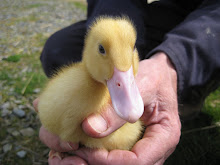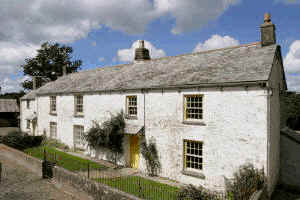 It's been over a week since I've had time to play blogger rather than farmer, trainer, or consultant. I've been shooting about like a mad ferret and the lead up to Christmas looks as if nothing's gonna change soon. I'm already planning a New Year's resolution; do more of the stuff I love, less of the stuff I don't, and tighten my belt.
It's been over a week since I've had time to play blogger rather than farmer, trainer, or consultant. I've been shooting about like a mad ferret and the lead up to Christmas looks as if nothing's gonna change soon. I'm already planning a New Year's resolution; do more of the stuff I love, less of the stuff I don't, and tighten my belt.So, although wearing slatey grey eyebags that would only lighten with copious applications of sleep, I kept an appointment made months ago to get up and go fairly early this morning with a friend off to the Devon and Cornwall Waterfowl Show at the Royal Cornwall Showground.
I had my eye on getting some more Black Indian Runner ducks to join Beany and co, so slid along the for sale section, clocked a nice young pair, shoved over to the Treasurer's desk, paid over my beer vouchers and clicked a sold label onto the cage so that I could go and admire the show birds at leisure.
Many shows auction their birds, so you have to wait hours if the pens you are keen on have high numbers, and you have no idea how optimistic the bidding will be. I much preferred this civilised approach - each pen had a clear price tag, and if there was no sold label, you sauntered apparently casually, but actually at top speed, to put down your dosh and the deal is done. No argy bargy, no haggling, no competition. Lovely.
 The long lines of runner ducks of every colour on show had me enthralled (only the white runners are on show in this photo). Unlike the other ducks of a more squat stature in square cages, runners are given tall pens to accommodate their naturally vertical stance. They stand in lines like soldiers on parade. It's a good thing they weren't all for sale or I'd have come home with armfuls of the beauties.
The long lines of runner ducks of every colour on show had me enthralled (only the white runners are on show in this photo). Unlike the other ducks of a more squat stature in square cages, runners are given tall pens to accommodate their naturally vertical stance. They stand in lines like soldiers on parade. It's a good thing they weren't all for sale or I'd have come home with armfuls of the beauties.I iffed and butted over two pens of Silver Appleyard ducks for a friend, but closer inspection revealed imperfections that I wouldn't have been happy with, so I resisted. I chortled over the Sebastopol geese - a lovely example in the photo above - with their crazy ringleted feathers, the Shirley Temple of the waterfowl world.
The only problem was that the huge cattle barn the event was held in was freezing. It was colder inside than out - we shivered as we walked into the shed and my feet were numb in ten minutes. There were very few people there; much more body heat was needed to create a comforting guff. But I'm back in the warm now, and my two new black beauties are on straw, with feed and water, and getting over the trauma of the journey and their new home.




















